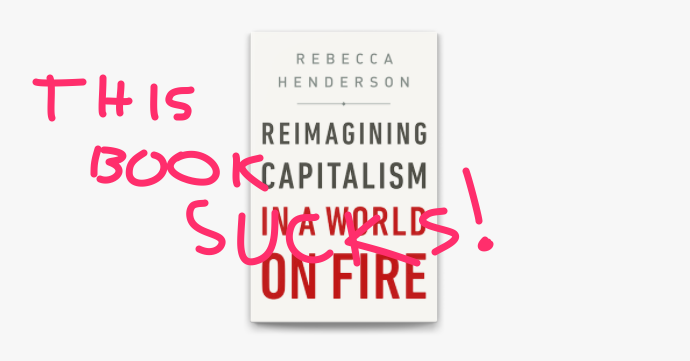These are my notes for the K5M Book Club on the book Reimagining Capitalism, by Rebecca Henderson.
These are my notes on Chapter 2 but we decided to quit reading this book because it is awful. The shareholders voted to quit with 96% approval.

So there will be no more notes on this book and I do not recommend it at all. If you have a recommendation for a book we should read, please let know.
UPDATE: Someone on Twitter asked why the book is bad and this review explains it perfectly. “Bad business fanfiction” is the mini-review I will quote from now on.
“Welcome to the world’s most important conversation” is the subtitle of this chapter. In the margins of my book I scribbled, “That is a BOLD claim.”
I have to say we might have made a mistake with this book. Another chapter in and it’s full of boring examples and quotes from the Matrix and platitudes about company leaders doing more. Is this book full of shit?
It feels like the target demographic is earnest college kids desperate for a defensive argument that it is okay to want to be titans of industry.

Erik Osmundsen, the CEO of a company that has reimagined capitalism, believes that the future of trash is in recycling and that there is the potential for recycling companies to be high-tech businesses that benefit from economies of scale. Which is great, right? I mean, we all love the idea of trash companies being super responsible about recycling, but I’d love to know why Erik thought this was true. It’s just states this as a belief he has and then we move on.
Harvard did a case study on Norsk Gjenvinning in 2015, and they were bought out by a private equity company I wonder if the case study increased the value of the company?
“85% of all waste transported in the country was in violation of the regulations.”
This kind of thing makes me a little bit mad. Yes, this is bad. But this is a failure of government and to highlight the success of business in solving the issue seems to let the government off the hook. It’s great that Erik and his trash friends stepped up and started doing the right thing, I love that part! But the answer can’t be to rely on businesses to police themselves. It just can’t! That’s a stupid plan!
Also, the part where Erik bought in a bunch of “raw talent” from places including Coca-Cola is… sort of weird. I like Coke, it’s my cola of choice, but Coca-Cola doesn’t exactly have a sterling reputation in regards to the environment.
The whole point of that first example seems to be “Man, imagine if companies were good instead of bad!” Which is… like, yeah, that’d be neat but isn’t exactly a path to practical solutions.
Henderson addresses the problems of what she calls “high road capitalism” as risky, disruptive, and difficult. So she seems to be acknowledging that her example company is an outlier and not something we can reasonably expect from business.
But then she goes one step further, putting the impetus for action not on the government to regulate, but on both the company and also the investors by saying “Transforming the behavior of investors is just as important as transforming the behavior of firms.”
But she doesn’t address this is any more detail here. The majority of investment dollars are held by giant firms that invest pension funds that just want, no, NEED, to see returns so they can pay out what they promised. There are so many intermediaries between investors and where the money is invested that no one actually cares as long as they see decent returns.
And what happens when people do take full control of their finances? Well, then we get “stonks.”
My problem with this book so far is that Henderson makes these claims like “investors need to care” but yeah, WE KNOW THAT ALREADY. Also, people need to stop shooting each other… but unless you have some plan of how to make that happen what the fuck is this book about?!
“One way to understand the history of the human race is to look at it as the story of our increasing ability to cooperate at larger and larger scales.”
I honestly can’t tell if my DSA membership is warping my mind or if I just hate Henderson. How do you look at the ever-growing power of the 1% and see that as “cooperation at scale”? She must be some kind of gold medal mental gymnast.
Somewhere near the end of the chapter I wrote “blah blah blah” in the margins in an attempt to gasp for air as the platitudes and meaningless patter pulled me under the riptide of boring bullshit.

You must be logged in to post a comment.